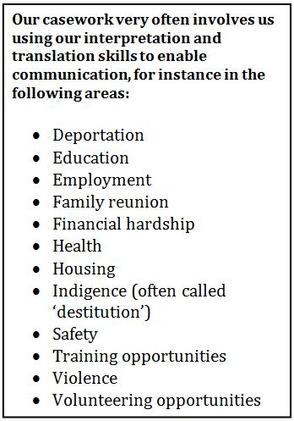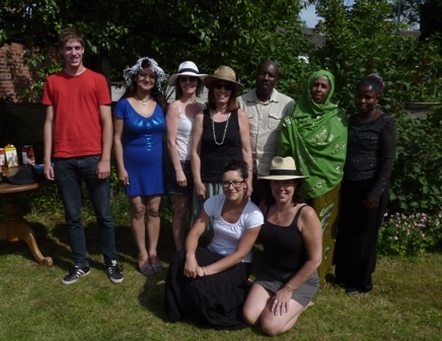Cases/Campaigns > Current Campaigns / About Casework / How To Make An Appointment / Examples Of Our Success / Casework Archive Index
ACTION COMPASSION TENACITY
|
|
|
What is ACT?
ACT is our casework division, combining Action and Compassion with Tenacity to tackle the human rights needs of individuals and families who come to us. ('Participants'.) On average, ACT has 20 active cases at any one time. These are a combination of individual and family situations involving up to 50 direct beneficiaries and this includes women, men and children. Cases range from relatively straightforward, and therefore short-term, to the more complex and correspondingly long-term. How does ACT work?
Participants work alongside volunteers to record problems, and work out how to begin to solve them. In this way the presenting participants are supported to directly involve themselves and acquire decision-making power about how to tackle their problems. They learn how systems actually work and what scope exists to change those systems’ responses to their needs. |

Who benefits from ACT?
In addition to the individuals and families involved themselves, our caseworkers and partnered external service providers benefit directly from the work that we do. In more simple cases, the number of beneficiaries who are ACT volunteers or external service providers and who learn from working the case may only number one or two. In more complex cases there may be upwards of 10 practitioners – both internal to ACT and external. Over time, some ACT volunteers take what they learn and move into higher education or other services as paid workers, so that those organisations then benefit from the learning developed here.
Why it’s hard to ACT!
The nature of this work is such that, sometimes, ACT finds itself exposing bad practice. That exposure may stimulate enquiries into the way some services are working and that may improve them in the longer term. For example, ACT’s initial casework led to a report in the magazine ‘Inside Housing’ and some ongoing investigative journalism about the Section 4 housing system operated by the Border and Immigration Authority, third sector service delivery and housing providers in the Greater Manchester area. (Nadeem, B. 20/02/2009 - 'Refugees Suffer as Homes Run Out')
In addition to the individuals and families involved themselves, our caseworkers and partnered external service providers benefit directly from the work that we do. In more simple cases, the number of beneficiaries who are ACT volunteers or external service providers and who learn from working the case may only number one or two. In more complex cases there may be upwards of 10 practitioners – both internal to ACT and external. Over time, some ACT volunteers take what they learn and move into higher education or other services as paid workers, so that those organisations then benefit from the learning developed here.
Why it’s hard to ACT!
The nature of this work is such that, sometimes, ACT finds itself exposing bad practice. That exposure may stimulate enquiries into the way some services are working and that may improve them in the longer term. For example, ACT’s initial casework led to a report in the magazine ‘Inside Housing’ and some ongoing investigative journalism about the Section 4 housing system operated by the Border and Immigration Authority, third sector service delivery and housing providers in the Greater Manchester area. (Nadeem, B. 20/02/2009 - 'Refugees Suffer as Homes Run Out')
Click here to see examples of our tenacity and some of our success stories
PLEASE ENABLE OUR CASEWORK
to further develop, refine and release the abilities of our participants, member volunteers, and external service deliverers to constructively solve problems and share their learning.
to further develop, refine and release the abilities of our participants, member volunteers, and external service deliverers to constructively solve problems and share their learning.


